Systematic Literature Review: High Protein Diet & Diabetes Risk
VerifiedAdded on 2023/01/19
|14
|3930
|82
Report
AI Summary
This systematic literature review examines the impact of high protein diets on the risk of developing Type 2 Diabetes. The study investigates the effects of different protein sources, including animal and plant-based proteins, on the development and progression of the disease. The review analyzed a range of studies, including cohort studies and meta-analyses, to assess the association between high protein intake and the risk of type 2 diabetes. The findings suggest that high consumption of animal protein, particularly red meat and processed meats, may increase the risk of type 2 diabetes, while plant-based protein sources appear to have a protective effect. The review also explores the relationship between specific dietary components, such as eggs and fish, and the risk of diabetes, highlighting the importance of considering the overall dietary pattern and food sources when evaluating the impact of protein intake on health outcomes. The study included studies published within the last 10 years and used various databases like Victoria University Library, Pubmed, Medline, and Google Scholar, following the PRISMA method for article selection. The quality of the studies was assessed using the CASP checklist.
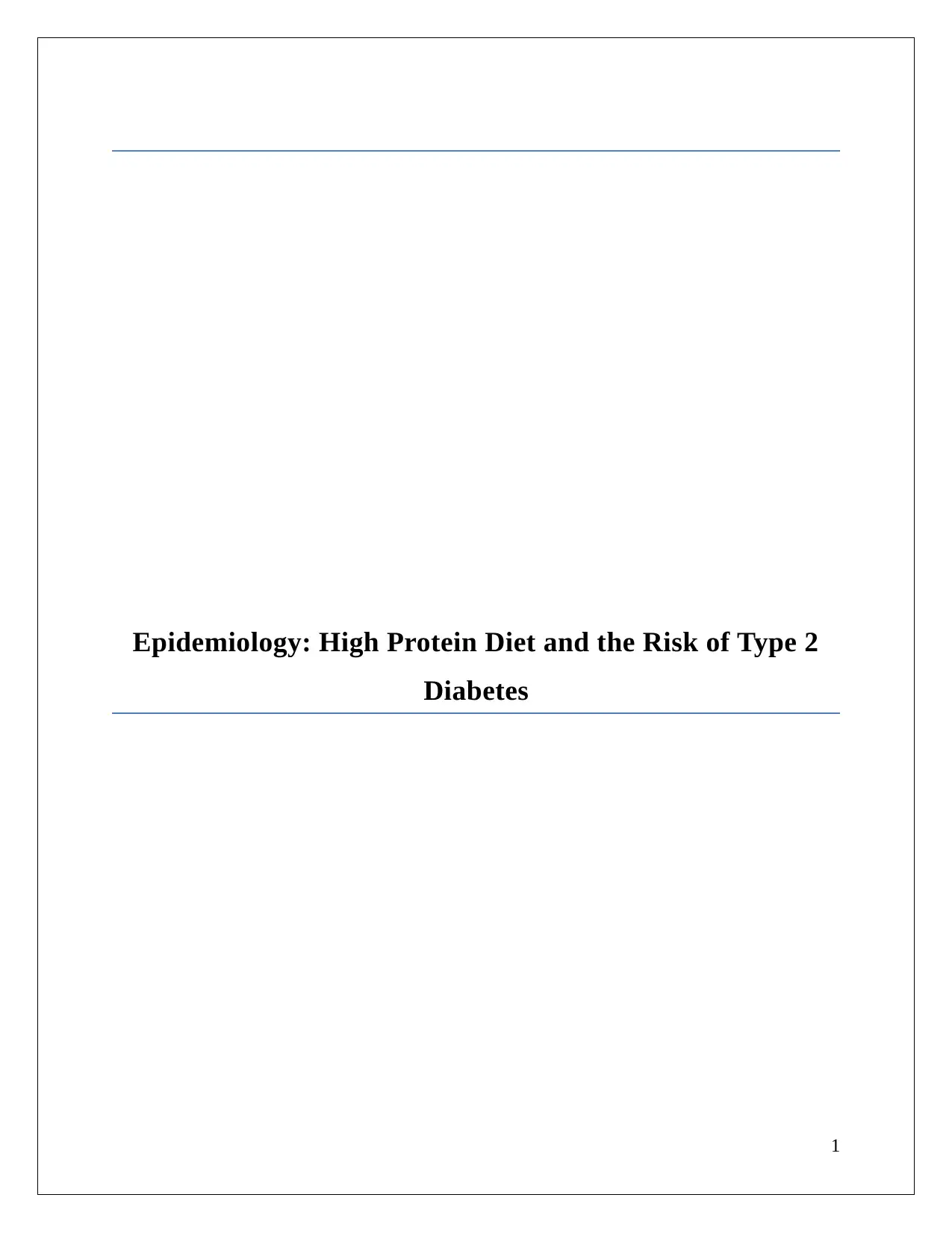
Epidemiology: High Protein Diet and the Risk of Type 2
Diabetes
1
Diabetes
1
Paraphrase This Document
Need a fresh take? Get an instant paraphrase of this document with our AI Paraphraser
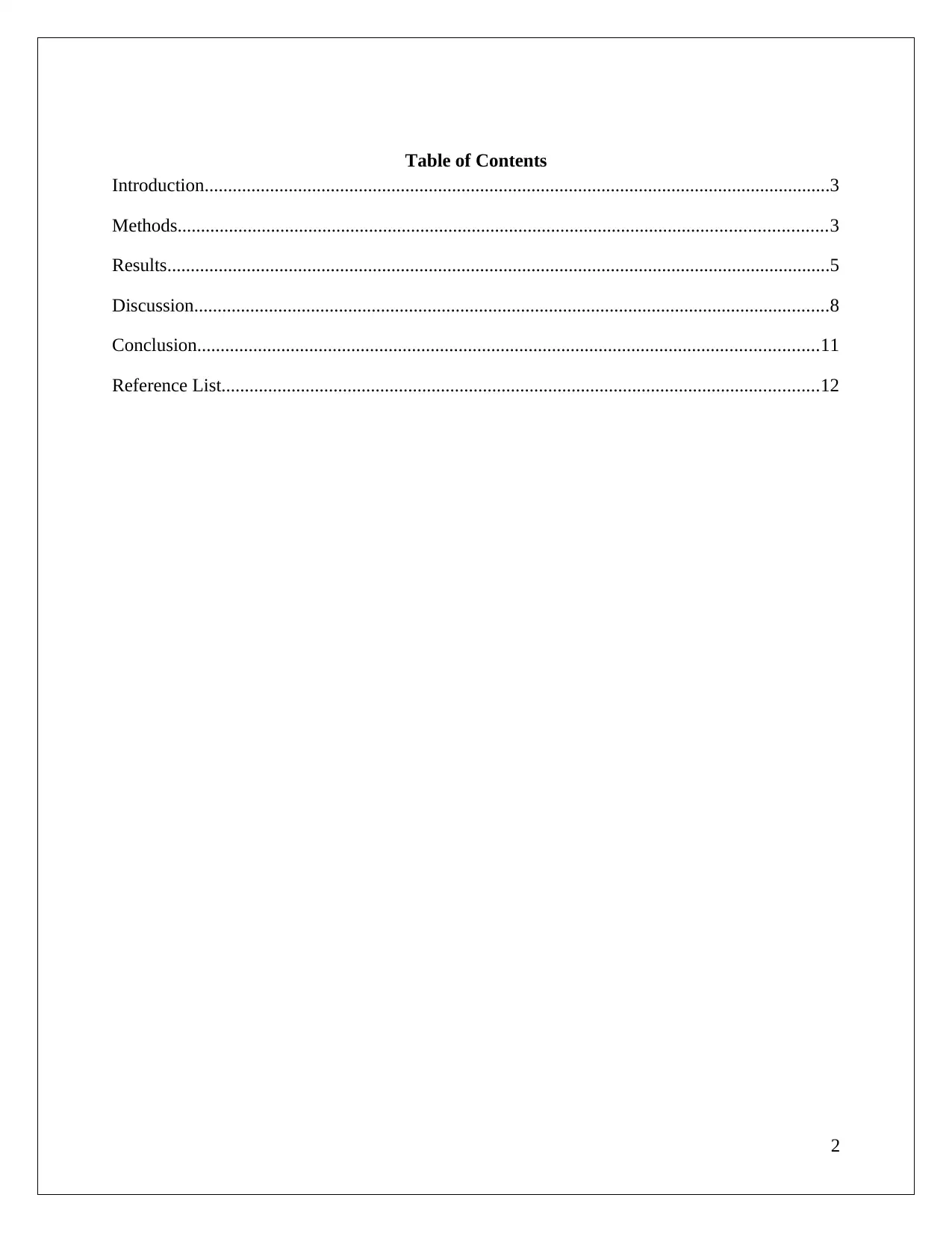
Table of Contents
Introduction......................................................................................................................................3
Methods...........................................................................................................................................3
Results..............................................................................................................................................5
Discussion........................................................................................................................................8
Conclusion.....................................................................................................................................11
Reference List................................................................................................................................12
2
Introduction......................................................................................................................................3
Methods...........................................................................................................................................3
Results..............................................................................................................................................5
Discussion........................................................................................................................................8
Conclusion.....................................................................................................................................11
Reference List................................................................................................................................12
2
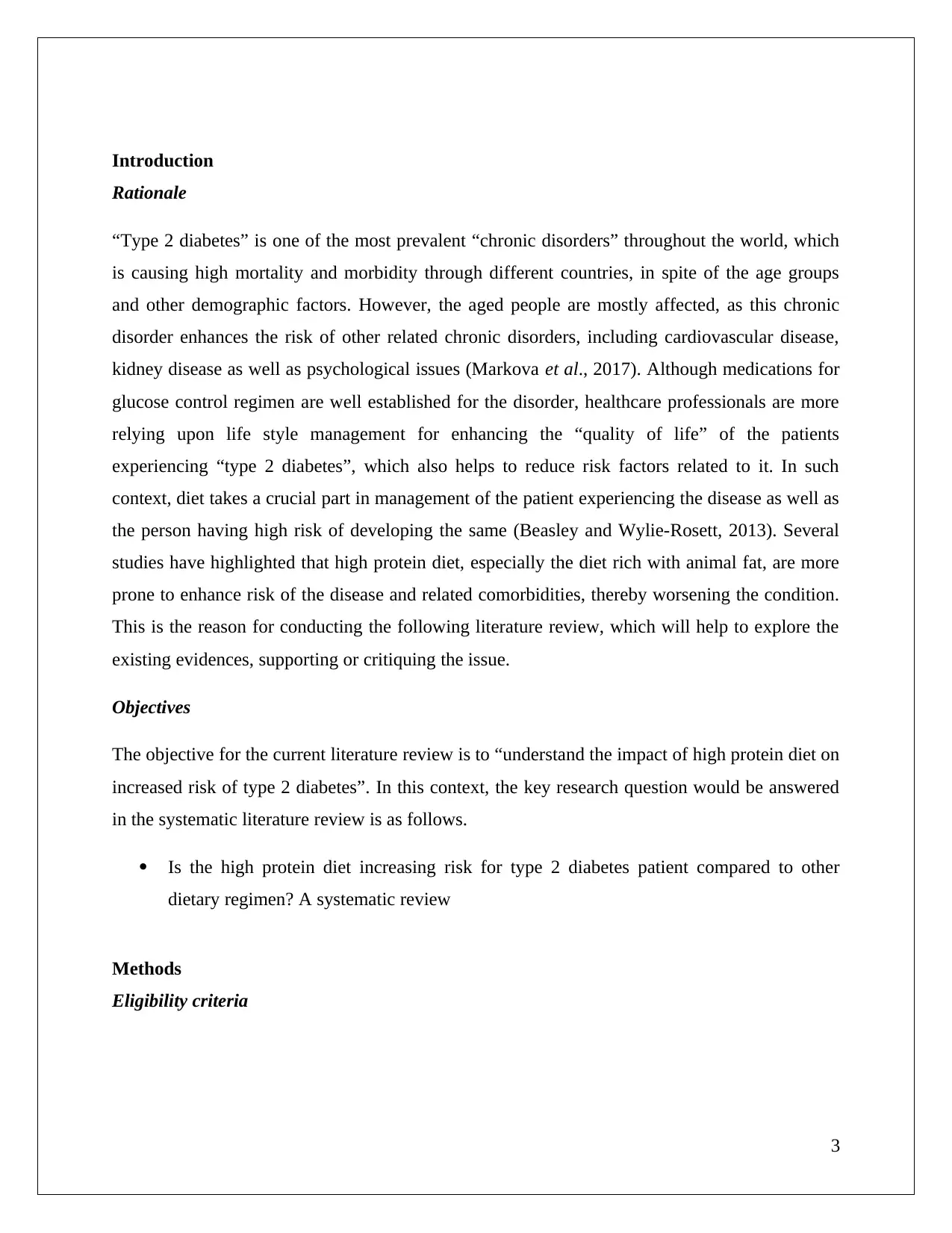
Introduction
Rationale
“Type 2 diabetes” is one of the most prevalent “chronic disorders” throughout the world, which
is causing high mortality and morbidity through different countries, in spite of the age groups
and other demographic factors. However, the aged people are mostly affected, as this chronic
disorder enhances the risk of other related chronic disorders, including cardiovascular disease,
kidney disease as well as psychological issues (Markova et al., 2017). Although medications for
glucose control regimen are well established for the disorder, healthcare professionals are more
relying upon life style management for enhancing the “quality of life” of the patients
experiencing “type 2 diabetes”, which also helps to reduce risk factors related to it. In such
context, diet takes a crucial part in management of the patient experiencing the disease as well as
the person having high risk of developing the same (Beasley and Wylie-Rosett, 2013). Several
studies have highlighted that high protein diet, especially the diet rich with animal fat, are more
prone to enhance risk of the disease and related comorbidities, thereby worsening the condition.
This is the reason for conducting the following literature review, which will help to explore the
existing evidences, supporting or critiquing the issue.
Objectives
The objective for the current literature review is to “understand the impact of high protein diet on
increased risk of type 2 diabetes”. In this context, the key research question would be answered
in the systematic literature review is as follows.
Is the high protein diet increasing risk for type 2 diabetes patient compared to other
dietary regimen? A systematic review
Methods
Eligibility criteria
3
Rationale
“Type 2 diabetes” is one of the most prevalent “chronic disorders” throughout the world, which
is causing high mortality and morbidity through different countries, in spite of the age groups
and other demographic factors. However, the aged people are mostly affected, as this chronic
disorder enhances the risk of other related chronic disorders, including cardiovascular disease,
kidney disease as well as psychological issues (Markova et al., 2017). Although medications for
glucose control regimen are well established for the disorder, healthcare professionals are more
relying upon life style management for enhancing the “quality of life” of the patients
experiencing “type 2 diabetes”, which also helps to reduce risk factors related to it. In such
context, diet takes a crucial part in management of the patient experiencing the disease as well as
the person having high risk of developing the same (Beasley and Wylie-Rosett, 2013). Several
studies have highlighted that high protein diet, especially the diet rich with animal fat, are more
prone to enhance risk of the disease and related comorbidities, thereby worsening the condition.
This is the reason for conducting the following literature review, which will help to explore the
existing evidences, supporting or critiquing the issue.
Objectives
The objective for the current literature review is to “understand the impact of high protein diet on
increased risk of type 2 diabetes”. In this context, the key research question would be answered
in the systematic literature review is as follows.
Is the high protein diet increasing risk for type 2 diabetes patient compared to other
dietary regimen? A systematic review
Methods
Eligibility criteria
3
⊘ This is a preview!⊘
Do you want full access?
Subscribe today to unlock all pages.

Trusted by 1+ million students worldwide
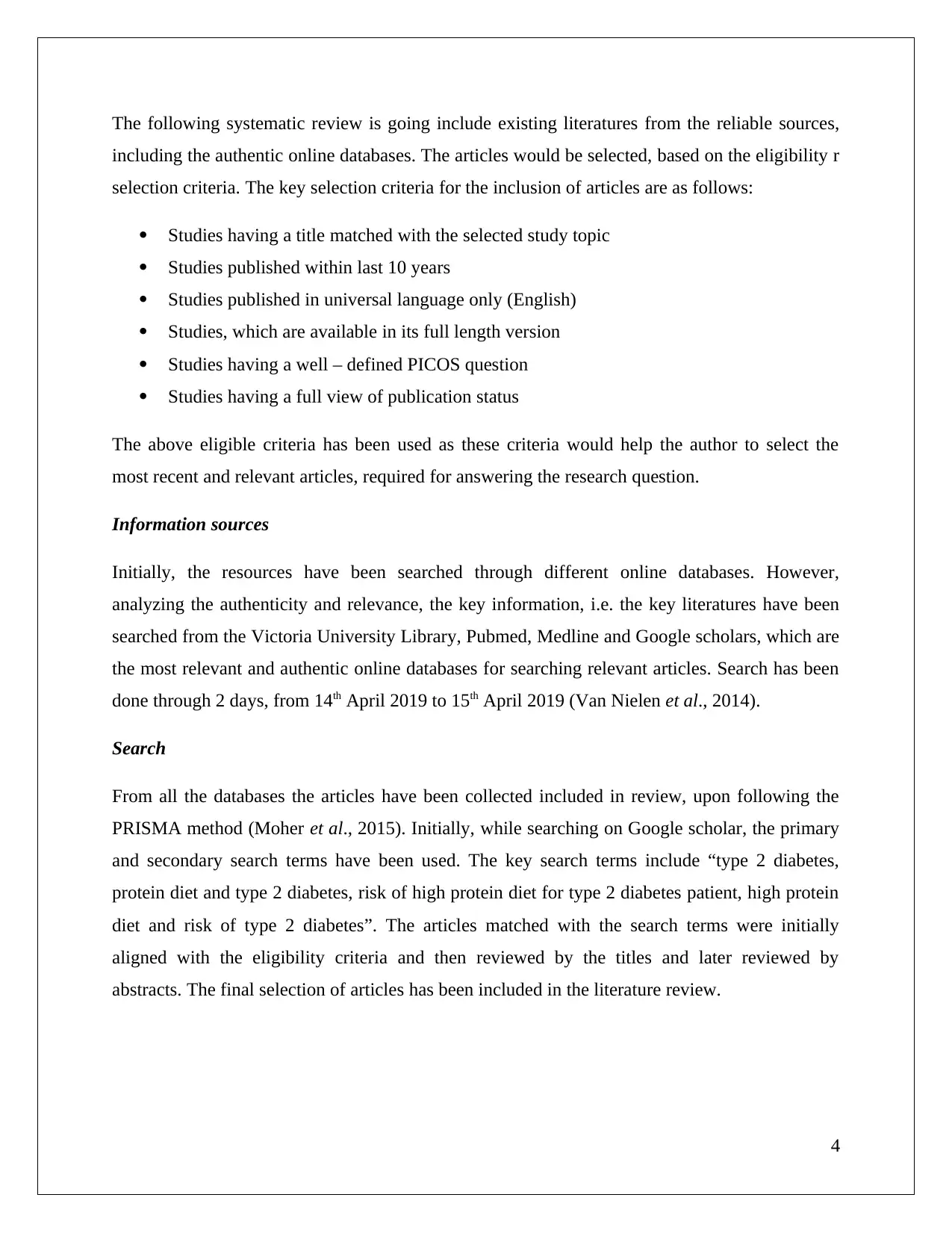
The following systematic review is going include existing literatures from the reliable sources,
including the authentic online databases. The articles would be selected, based on the eligibility r
selection criteria. The key selection criteria for the inclusion of articles are as follows:
Studies having a title matched with the selected study topic
Studies published within last 10 years
Studies published in universal language only (English)
Studies, which are available in its full length version
Studies having a well – defined PICOS question
Studies having a full view of publication status
The above eligible criteria has been used as these criteria would help the author to select the
most recent and relevant articles, required for answering the research question.
Information sources
Initially, the resources have been searched through different online databases. However,
analyzing the authenticity and relevance, the key information, i.e. the key literatures have been
searched from the Victoria University Library, Pubmed, Medline and Google scholars, which are
the most relevant and authentic online databases for searching relevant articles. Search has been
done through 2 days, from 14th April 2019 to 15th April 2019 (Van Nielen et al., 2014).
Search
From all the databases the articles have been collected included in review, upon following the
PRISMA method (Moher et al., 2015). Initially, while searching on Google scholar, the primary
and secondary search terms have been used. The key search terms include “type 2 diabetes,
protein diet and type 2 diabetes, risk of high protein diet for type 2 diabetes patient, high protein
diet and risk of type 2 diabetes”. The articles matched with the search terms were initially
aligned with the eligibility criteria and then reviewed by the titles and later reviewed by
abstracts. The final selection of articles has been included in the literature review.
4
including the authentic online databases. The articles would be selected, based on the eligibility r
selection criteria. The key selection criteria for the inclusion of articles are as follows:
Studies having a title matched with the selected study topic
Studies published within last 10 years
Studies published in universal language only (English)
Studies, which are available in its full length version
Studies having a well – defined PICOS question
Studies having a full view of publication status
The above eligible criteria has been used as these criteria would help the author to select the
most recent and relevant articles, required for answering the research question.
Information sources
Initially, the resources have been searched through different online databases. However,
analyzing the authenticity and relevance, the key information, i.e. the key literatures have been
searched from the Victoria University Library, Pubmed, Medline and Google scholars, which are
the most relevant and authentic online databases for searching relevant articles. Search has been
done through 2 days, from 14th April 2019 to 15th April 2019 (Van Nielen et al., 2014).
Search
From all the databases the articles have been collected included in review, upon following the
PRISMA method (Moher et al., 2015). Initially, while searching on Google scholar, the primary
and secondary search terms have been used. The key search terms include “type 2 diabetes,
protein diet and type 2 diabetes, risk of high protein diet for type 2 diabetes patient, high protein
diet and risk of type 2 diabetes”. The articles matched with the search terms were initially
aligned with the eligibility criteria and then reviewed by the titles and later reviewed by
abstracts. The final selection of articles has been included in the literature review.
4
Paraphrase This Document
Need a fresh take? Get an instant paraphrase of this document with our AI Paraphraser
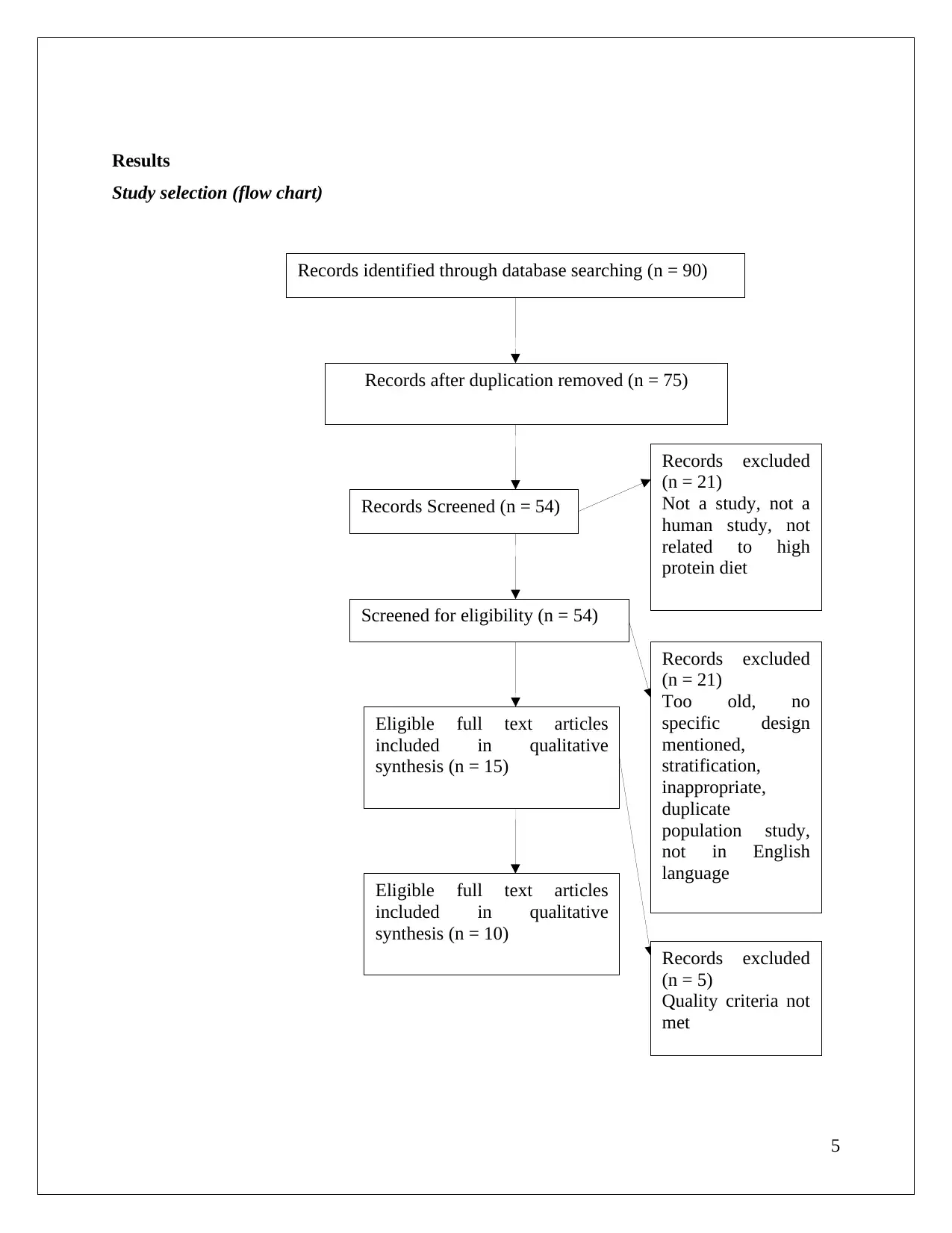
Records identified through database searching (n = 90)
Records after duplication removed (n = 75)
Records Screened (n = 54)
Records excluded
(n = 21)
Not a study, not a
human study, not
related to high
protein diet
Eligible full text articles
included in qualitative
synthesis (n = 15)
Screened for eligibility (n = 54)
Records excluded
(n = 21)
Too old, no
specific design
mentioned,
stratification,
inappropriate,
duplicate
population study,
not in English
language
Eligible full text articles
included in qualitative
synthesis (n = 10)
Records excluded
(n = 5)
Quality criteria not
met
Results
Study selection (flow chart)
5
Records after duplication removed (n = 75)
Records Screened (n = 54)
Records excluded
(n = 21)
Not a study, not a
human study, not
related to high
protein diet
Eligible full text articles
included in qualitative
synthesis (n = 15)
Screened for eligibility (n = 54)
Records excluded
(n = 21)
Too old, no
specific design
mentioned,
stratification,
inappropriate,
duplicate
population study,
not in English
language
Eligible full text articles
included in qualitative
synthesis (n = 10)
Records excluded
(n = 5)
Quality criteria not
met
Results
Study selection (flow chart)
5

6
⊘ This is a preview!⊘
Do you want full access?
Subscribe today to unlock all pages.

Trusted by 1+ million students worldwide
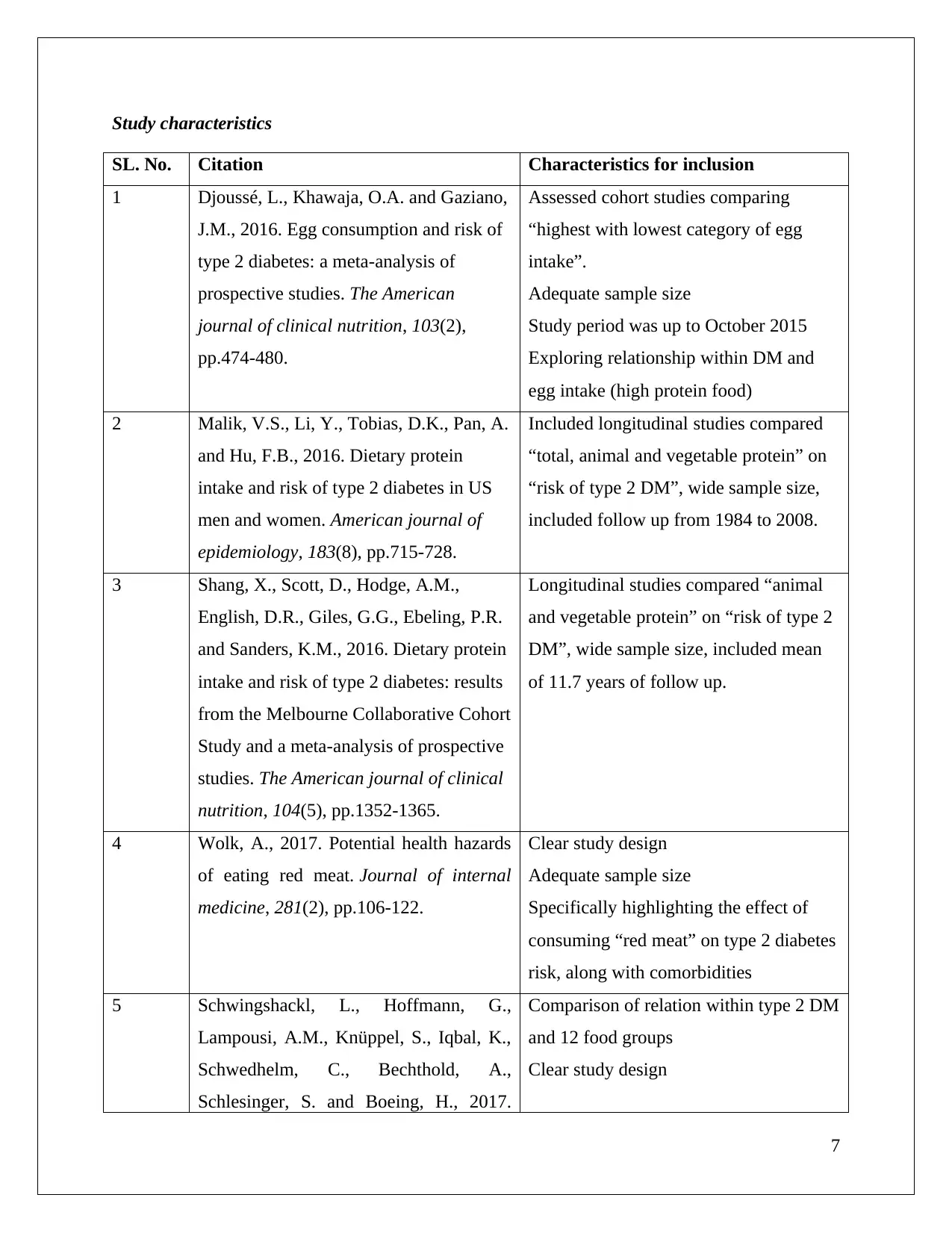
Study characteristics
SL. No. Citation Characteristics for inclusion
1 Djoussé, L., Khawaja, O.A. and Gaziano,
J.M., 2016. Egg consumption and risk of
type 2 diabetes: a meta-analysis of
prospective studies. The American
journal of clinical nutrition, 103(2),
pp.474-480.
Assessed cohort studies comparing
“highest with lowest category of egg
intake”.
Adequate sample size
Study period was up to October 2015
Exploring relationship within DM and
egg intake (high protein food)
2 Malik, V.S., Li, Y., Tobias, D.K., Pan, A.
and Hu, F.B., 2016. Dietary protein
intake and risk of type 2 diabetes in US
men and women. American journal of
epidemiology, 183(8), pp.715-728.
Included longitudinal studies compared
“total, animal and vegetable protein” on
“risk of type 2 DM”, wide sample size,
included follow up from 1984 to 2008.
3 Shang, X., Scott, D., Hodge, A.M.,
English, D.R., Giles, G.G., Ebeling, P.R.
and Sanders, K.M., 2016. Dietary protein
intake and risk of type 2 diabetes: results
from the Melbourne Collaborative Cohort
Study and a meta-analysis of prospective
studies. The American journal of clinical
nutrition, 104(5), pp.1352-1365.
Longitudinal studies compared “animal
and vegetable protein” on “risk of type 2
DM”, wide sample size, included mean
of 11.7 years of follow up.
4 Wolk, A., 2017. Potential health hazards
of eating red meat. Journal of internal
medicine, 281(2), pp.106-122.
Clear study design
Adequate sample size
Specifically highlighting the effect of
consuming “red meat” on type 2 diabetes
risk, along with comorbidities
5 Schwingshackl, L., Hoffmann, G.,
Lampousi, A.M., Knüppel, S., Iqbal, K.,
Schwedhelm, C., Bechthold, A.,
Schlesinger, S. and Boeing, H., 2017.
Comparison of relation within type 2 DM
and 12 food groups
Clear study design
7
SL. No. Citation Characteristics for inclusion
1 Djoussé, L., Khawaja, O.A. and Gaziano,
J.M., 2016. Egg consumption and risk of
type 2 diabetes: a meta-analysis of
prospective studies. The American
journal of clinical nutrition, 103(2),
pp.474-480.
Assessed cohort studies comparing
“highest with lowest category of egg
intake”.
Adequate sample size
Study period was up to October 2015
Exploring relationship within DM and
egg intake (high protein food)
2 Malik, V.S., Li, Y., Tobias, D.K., Pan, A.
and Hu, F.B., 2016. Dietary protein
intake and risk of type 2 diabetes in US
men and women. American journal of
epidemiology, 183(8), pp.715-728.
Included longitudinal studies compared
“total, animal and vegetable protein” on
“risk of type 2 DM”, wide sample size,
included follow up from 1984 to 2008.
3 Shang, X., Scott, D., Hodge, A.M.,
English, D.R., Giles, G.G., Ebeling, P.R.
and Sanders, K.M., 2016. Dietary protein
intake and risk of type 2 diabetes: results
from the Melbourne Collaborative Cohort
Study and a meta-analysis of prospective
studies. The American journal of clinical
nutrition, 104(5), pp.1352-1365.
Longitudinal studies compared “animal
and vegetable protein” on “risk of type 2
DM”, wide sample size, included mean
of 11.7 years of follow up.
4 Wolk, A., 2017. Potential health hazards
of eating red meat. Journal of internal
medicine, 281(2), pp.106-122.
Clear study design
Adequate sample size
Specifically highlighting the effect of
consuming “red meat” on type 2 diabetes
risk, along with comorbidities
5 Schwingshackl, L., Hoffmann, G.,
Lampousi, A.M., Knüppel, S., Iqbal, K.,
Schwedhelm, C., Bechthold, A.,
Schlesinger, S. and Boeing, H., 2017.
Comparison of relation within type 2 DM
and 12 food groups
Clear study design
7
Paraphrase This Document
Need a fresh take? Get an instant paraphrase of this document with our AI Paraphraser
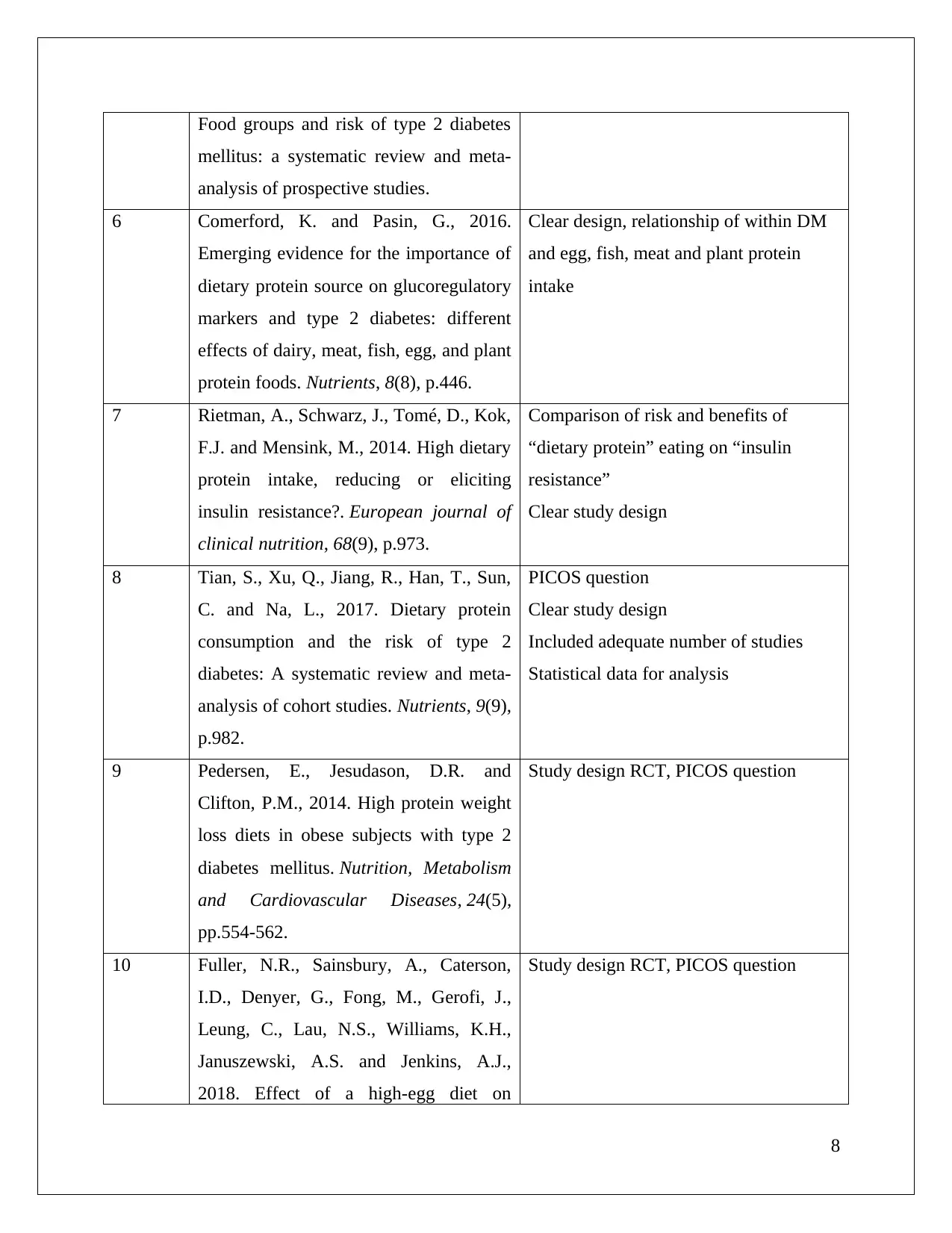
Food groups and risk of type 2 diabetes
mellitus: a systematic review and meta-
analysis of prospective studies.
6 Comerford, K. and Pasin, G., 2016.
Emerging evidence for the importance of
dietary protein source on glucoregulatory
markers and type 2 diabetes: different
effects of dairy, meat, fish, egg, and plant
protein foods. Nutrients, 8(8), p.446.
Clear design, relationship of within DM
and egg, fish, meat and plant protein
intake
7 Rietman, A., Schwarz, J., Tomé, D., Kok,
F.J. and Mensink, M., 2014. High dietary
protein intake, reducing or eliciting
insulin resistance?. European journal of
clinical nutrition, 68(9), p.973.
Comparison of risk and benefits of
“dietary protein” eating on “insulin
resistance”
Clear study design
8 Tian, S., Xu, Q., Jiang, R., Han, T., Sun,
C. and Na, L., 2017. Dietary protein
consumption and the risk of type 2
diabetes: A systematic review and meta-
analysis of cohort studies. Nutrients, 9(9),
p.982.
PICOS question
Clear study design
Included adequate number of studies
Statistical data for analysis
9 Pedersen, E., Jesudason, D.R. and
Clifton, P.M., 2014. High protein weight
loss diets in obese subjects with type 2
diabetes mellitus. Nutrition, Metabolism
and Cardiovascular Diseases, 24(5),
pp.554-562.
Study design RCT, PICOS question
10 Fuller, N.R., Sainsbury, A., Caterson,
I.D., Denyer, G., Fong, M., Gerofi, J.,
Leung, C., Lau, N.S., Williams, K.H.,
Januszewski, A.S. and Jenkins, A.J.,
2018. Effect of a high-egg diet on
Study design RCT, PICOS question
8
mellitus: a systematic review and meta-
analysis of prospective studies.
6 Comerford, K. and Pasin, G., 2016.
Emerging evidence for the importance of
dietary protein source on glucoregulatory
markers and type 2 diabetes: different
effects of dairy, meat, fish, egg, and plant
protein foods. Nutrients, 8(8), p.446.
Clear design, relationship of within DM
and egg, fish, meat and plant protein
intake
7 Rietman, A., Schwarz, J., Tomé, D., Kok,
F.J. and Mensink, M., 2014. High dietary
protein intake, reducing or eliciting
insulin resistance?. European journal of
clinical nutrition, 68(9), p.973.
Comparison of risk and benefits of
“dietary protein” eating on “insulin
resistance”
Clear study design
8 Tian, S., Xu, Q., Jiang, R., Han, T., Sun,
C. and Na, L., 2017. Dietary protein
consumption and the risk of type 2
diabetes: A systematic review and meta-
analysis of cohort studies. Nutrients, 9(9),
p.982.
PICOS question
Clear study design
Included adequate number of studies
Statistical data for analysis
9 Pedersen, E., Jesudason, D.R. and
Clifton, P.M., 2014. High protein weight
loss diets in obese subjects with type 2
diabetes mellitus. Nutrition, Metabolism
and Cardiovascular Diseases, 24(5),
pp.554-562.
Study design RCT, PICOS question
10 Fuller, N.R., Sainsbury, A., Caterson,
I.D., Denyer, G., Fong, M., Gerofi, J.,
Leung, C., Lau, N.S., Williams, K.H.,
Januszewski, A.S. and Jenkins, A.J.,
2018. Effect of a high-egg diet on
Study design RCT, PICOS question
8
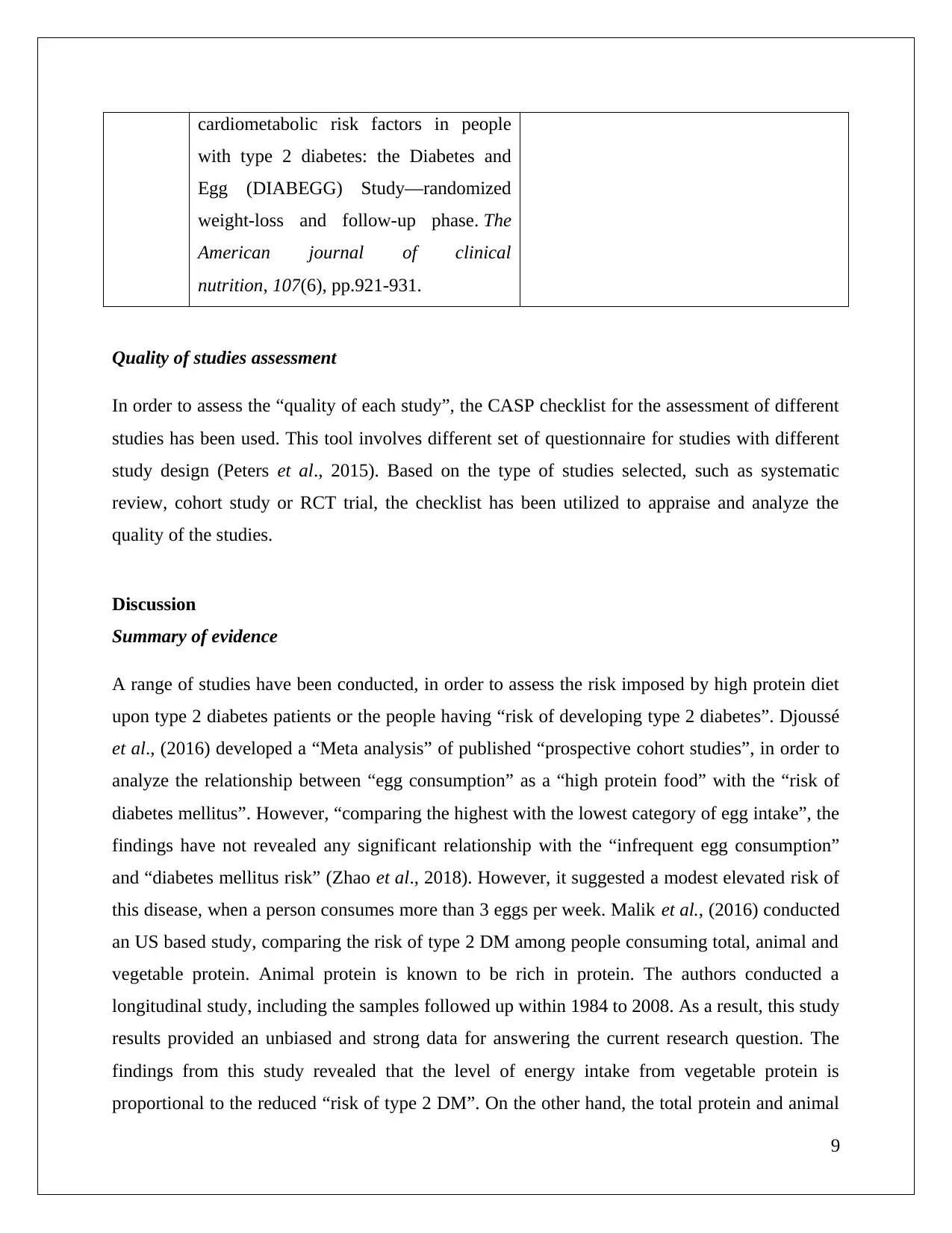
cardiometabolic risk factors in people
with type 2 diabetes: the Diabetes and
Egg (DIABEGG) Study—randomized
weight-loss and follow-up phase. The
American journal of clinical
nutrition, 107(6), pp.921-931.
Quality of studies assessment
In order to assess the “quality of each study”, the CASP checklist for the assessment of different
studies has been used. This tool involves different set of questionnaire for studies with different
study design (Peters et al., 2015). Based on the type of studies selected, such as systematic
review, cohort study or RCT trial, the checklist has been utilized to appraise and analyze the
quality of the studies.
Discussion
Summary of evidence
A range of studies have been conducted, in order to assess the risk imposed by high protein diet
upon type 2 diabetes patients or the people having “risk of developing type 2 diabetes”. Djoussé
et al., (2016) developed a “Meta analysis” of published “prospective cohort studies”, in order to
analyze the relationship between “egg consumption” as a “high protein food” with the “risk of
diabetes mellitus”. However, “comparing the highest with the lowest category of egg intake”, the
findings have not revealed any significant relationship with the “infrequent egg consumption”
and “diabetes mellitus risk” (Zhao et al., 2018). However, it suggested a modest elevated risk of
this disease, when a person consumes more than 3 eggs per week. Malik et al., (2016) conducted
an US based study, comparing the risk of type 2 DM among people consuming total, animal and
vegetable protein. Animal protein is known to be rich in protein. The authors conducted a
longitudinal study, including the samples followed up within 1984 to 2008. As a result, this study
results provided an unbiased and strong data for answering the current research question. The
findings from this study revealed that the level of energy intake from vegetable protein is
proportional to the reduced “risk of type 2 DM”. On the other hand, the total protein and animal
9
with type 2 diabetes: the Diabetes and
Egg (DIABEGG) Study—randomized
weight-loss and follow-up phase. The
American journal of clinical
nutrition, 107(6), pp.921-931.
Quality of studies assessment
In order to assess the “quality of each study”, the CASP checklist for the assessment of different
studies has been used. This tool involves different set of questionnaire for studies with different
study design (Peters et al., 2015). Based on the type of studies selected, such as systematic
review, cohort study or RCT trial, the checklist has been utilized to appraise and analyze the
quality of the studies.
Discussion
Summary of evidence
A range of studies have been conducted, in order to assess the risk imposed by high protein diet
upon type 2 diabetes patients or the people having “risk of developing type 2 diabetes”. Djoussé
et al., (2016) developed a “Meta analysis” of published “prospective cohort studies”, in order to
analyze the relationship between “egg consumption” as a “high protein food” with the “risk of
diabetes mellitus”. However, “comparing the highest with the lowest category of egg intake”, the
findings have not revealed any significant relationship with the “infrequent egg consumption”
and “diabetes mellitus risk” (Zhao et al., 2018). However, it suggested a modest elevated risk of
this disease, when a person consumes more than 3 eggs per week. Malik et al., (2016) conducted
an US based study, comparing the risk of type 2 DM among people consuming total, animal and
vegetable protein. Animal protein is known to be rich in protein. The authors conducted a
longitudinal study, including the samples followed up within 1984 to 2008. As a result, this study
results provided an unbiased and strong data for answering the current research question. The
findings from this study revealed that the level of energy intake from vegetable protein is
proportional to the reduced “risk of type 2 DM”. On the other hand, the total protein and animal
9
⊘ This is a preview!⊘
Do you want full access?
Subscribe today to unlock all pages.

Trusted by 1+ million students worldwide
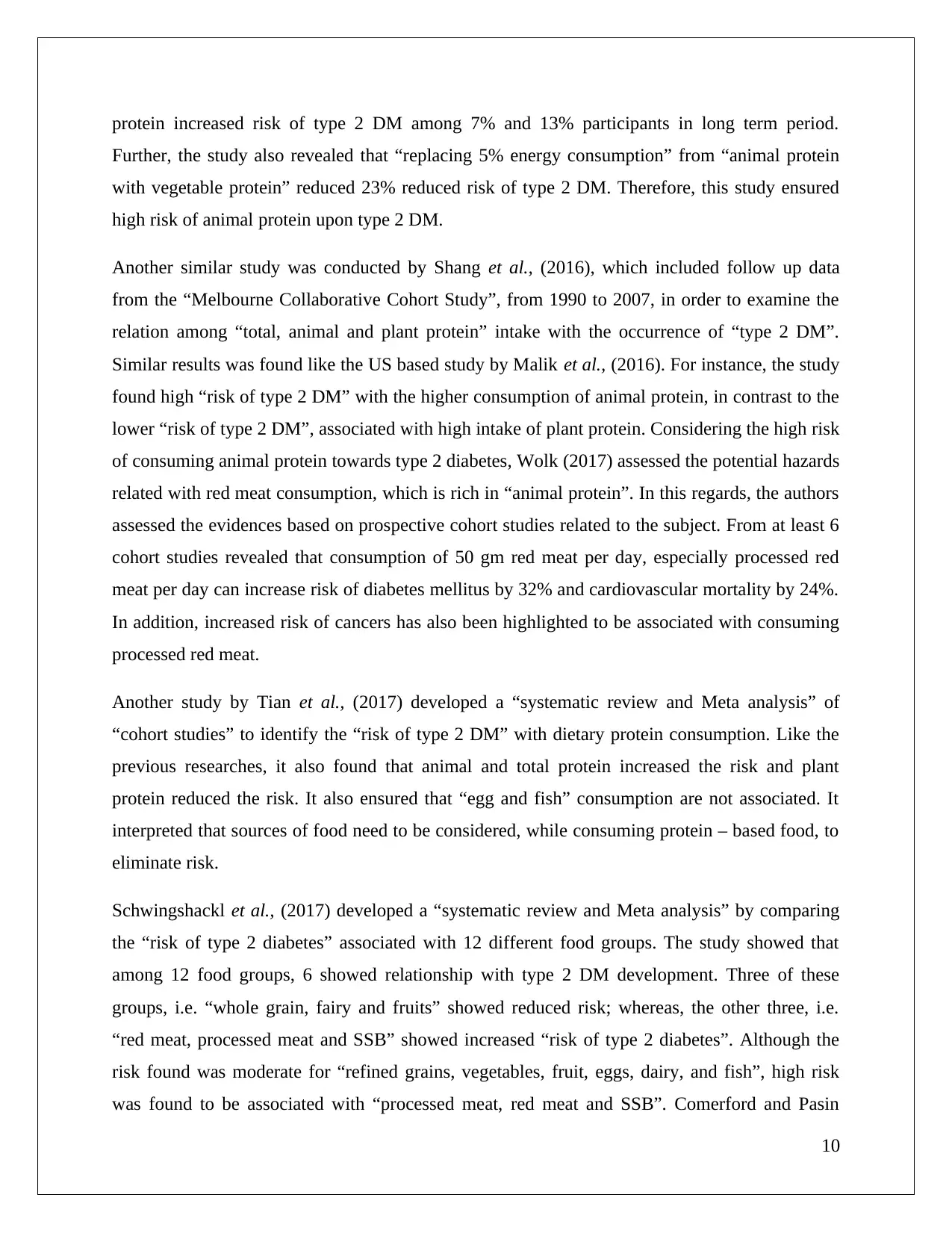
protein increased risk of type 2 DM among 7% and 13% participants in long term period.
Further, the study also revealed that “replacing 5% energy consumption” from “animal protein
with vegetable protein” reduced 23% reduced risk of type 2 DM. Therefore, this study ensured
high risk of animal protein upon type 2 DM.
Another similar study was conducted by Shang et al., (2016), which included follow up data
from the “Melbourne Collaborative Cohort Study”, from 1990 to 2007, in order to examine the
relation among “total, animal and plant protein” intake with the occurrence of “type 2 DM”.
Similar results was found like the US based study by Malik et al., (2016). For instance, the study
found high “risk of type 2 DM” with the higher consumption of animal protein, in contrast to the
lower “risk of type 2 DM”, associated with high intake of plant protein. Considering the high risk
of consuming animal protein towards type 2 diabetes, Wolk (2017) assessed the potential hazards
related with red meat consumption, which is rich in “animal protein”. In this regards, the authors
assessed the evidences based on prospective cohort studies related to the subject. From at least 6
cohort studies revealed that consumption of 50 gm red meat per day, especially processed red
meat per day can increase risk of diabetes mellitus by 32% and cardiovascular mortality by 24%.
In addition, increased risk of cancers has also been highlighted to be associated with consuming
processed red meat.
Another study by Tian et al., (2017) developed a “systematic review and Meta analysis” of
“cohort studies” to identify the “risk of type 2 DM” with dietary protein consumption. Like the
previous researches, it also found that animal and total protein increased the risk and plant
protein reduced the risk. It also ensured that “egg and fish” consumption are not associated. It
interpreted that sources of food need to be considered, while consuming protein – based food, to
eliminate risk.
Schwingshackl et al., (2017) developed a “systematic review and Meta analysis” by comparing
the “risk of type 2 diabetes” associated with 12 different food groups. The study showed that
among 12 food groups, 6 showed relationship with type 2 DM development. Three of these
groups, i.e. “whole grain, fairy and fruits” showed reduced risk; whereas, the other three, i.e.
“red meat, processed meat and SSB” showed increased “risk of type 2 diabetes”. Although the
risk found was moderate for “refined grains, vegetables, fruit, eggs, dairy, and fish”, high risk
was found to be associated with “processed meat, red meat and SSB”. Comerford and Pasin
10
Further, the study also revealed that “replacing 5% energy consumption” from “animal protein
with vegetable protein” reduced 23% reduced risk of type 2 DM. Therefore, this study ensured
high risk of animal protein upon type 2 DM.
Another similar study was conducted by Shang et al., (2016), which included follow up data
from the “Melbourne Collaborative Cohort Study”, from 1990 to 2007, in order to examine the
relation among “total, animal and plant protein” intake with the occurrence of “type 2 DM”.
Similar results was found like the US based study by Malik et al., (2016). For instance, the study
found high “risk of type 2 DM” with the higher consumption of animal protein, in contrast to the
lower “risk of type 2 DM”, associated with high intake of plant protein. Considering the high risk
of consuming animal protein towards type 2 diabetes, Wolk (2017) assessed the potential hazards
related with red meat consumption, which is rich in “animal protein”. In this regards, the authors
assessed the evidences based on prospective cohort studies related to the subject. From at least 6
cohort studies revealed that consumption of 50 gm red meat per day, especially processed red
meat per day can increase risk of diabetes mellitus by 32% and cardiovascular mortality by 24%.
In addition, increased risk of cancers has also been highlighted to be associated with consuming
processed red meat.
Another study by Tian et al., (2017) developed a “systematic review and Meta analysis” of
“cohort studies” to identify the “risk of type 2 DM” with dietary protein consumption. Like the
previous researches, it also found that animal and total protein increased the risk and plant
protein reduced the risk. It also ensured that “egg and fish” consumption are not associated. It
interpreted that sources of food need to be considered, while consuming protein – based food, to
eliminate risk.
Schwingshackl et al., (2017) developed a “systematic review and Meta analysis” by comparing
the “risk of type 2 diabetes” associated with 12 different food groups. The study showed that
among 12 food groups, 6 showed relationship with type 2 DM development. Three of these
groups, i.e. “whole grain, fairy and fruits” showed reduced risk; whereas, the other three, i.e.
“red meat, processed meat and SSB” showed increased “risk of type 2 diabetes”. Although the
risk found was moderate for “refined grains, vegetables, fruit, eggs, dairy, and fish”, high risk
was found to be associated with “processed meat, red meat and SSB”. Comerford and Pasin
10
Paraphrase This Document
Need a fresh take? Get an instant paraphrase of this document with our AI Paraphraser
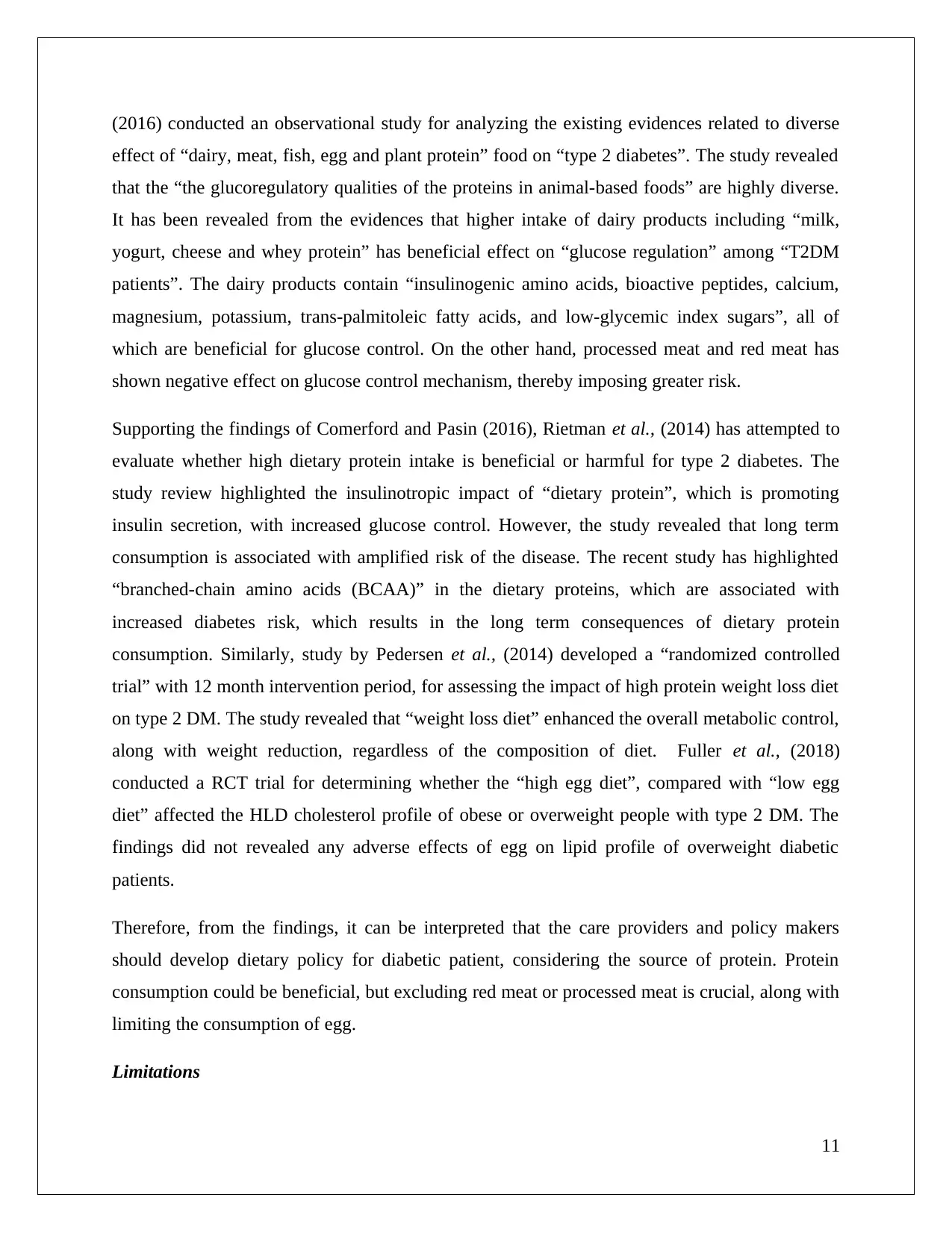
(2016) conducted an observational study for analyzing the existing evidences related to diverse
effect of “dairy, meat, fish, egg and plant protein” food on “type 2 diabetes”. The study revealed
that the “the glucoregulatory qualities of the proteins in animal-based foods” are highly diverse.
It has been revealed from the evidences that higher intake of dairy products including “milk,
yogurt, cheese and whey protein” has beneficial effect on “glucose regulation” among “T2DM
patients”. The dairy products contain “insulinogenic amino acids, bioactive peptides, calcium,
magnesium, potassium, trans-palmitoleic fatty acids, and low-glycemic index sugars”, all of
which are beneficial for glucose control. On the other hand, processed meat and red meat has
shown negative effect on glucose control mechanism, thereby imposing greater risk.
Supporting the findings of Comerford and Pasin (2016), Rietman et al., (2014) has attempted to
evaluate whether high dietary protein intake is beneficial or harmful for type 2 diabetes. The
study review highlighted the insulinotropic impact of “dietary protein”, which is promoting
insulin secretion, with increased glucose control. However, the study revealed that long term
consumption is associated with amplified risk of the disease. The recent study has highlighted
“branched-chain amino acids (BCAA)” in the dietary proteins, which are associated with
increased diabetes risk, which results in the long term consequences of dietary protein
consumption. Similarly, study by Pedersen et al., (2014) developed a “randomized controlled
trial” with 12 month intervention period, for assessing the impact of high protein weight loss diet
on type 2 DM. The study revealed that “weight loss diet” enhanced the overall metabolic control,
along with weight reduction, regardless of the composition of diet. Fuller et al., (2018)
conducted a RCT trial for determining whether the “high egg diet”, compared with “low egg
diet” affected the HLD cholesterol profile of obese or overweight people with type 2 DM. The
findings did not revealed any adverse effects of egg on lipid profile of overweight diabetic
patients.
Therefore, from the findings, it can be interpreted that the care providers and policy makers
should develop dietary policy for diabetic patient, considering the source of protein. Protein
consumption could be beneficial, but excluding red meat or processed meat is crucial, along with
limiting the consumption of egg.
Limitations
11
effect of “dairy, meat, fish, egg and plant protein” food on “type 2 diabetes”. The study revealed
that the “the glucoregulatory qualities of the proteins in animal-based foods” are highly diverse.
It has been revealed from the evidences that higher intake of dairy products including “milk,
yogurt, cheese and whey protein” has beneficial effect on “glucose regulation” among “T2DM
patients”. The dairy products contain “insulinogenic amino acids, bioactive peptides, calcium,
magnesium, potassium, trans-palmitoleic fatty acids, and low-glycemic index sugars”, all of
which are beneficial for glucose control. On the other hand, processed meat and red meat has
shown negative effect on glucose control mechanism, thereby imposing greater risk.
Supporting the findings of Comerford and Pasin (2016), Rietman et al., (2014) has attempted to
evaluate whether high dietary protein intake is beneficial or harmful for type 2 diabetes. The
study review highlighted the insulinotropic impact of “dietary protein”, which is promoting
insulin secretion, with increased glucose control. However, the study revealed that long term
consumption is associated with amplified risk of the disease. The recent study has highlighted
“branched-chain amino acids (BCAA)” in the dietary proteins, which are associated with
increased diabetes risk, which results in the long term consequences of dietary protein
consumption. Similarly, study by Pedersen et al., (2014) developed a “randomized controlled
trial” with 12 month intervention period, for assessing the impact of high protein weight loss diet
on type 2 DM. The study revealed that “weight loss diet” enhanced the overall metabolic control,
along with weight reduction, regardless of the composition of diet. Fuller et al., (2018)
conducted a RCT trial for determining whether the “high egg diet”, compared with “low egg
diet” affected the HLD cholesterol profile of obese or overweight people with type 2 DM. The
findings did not revealed any adverse effects of egg on lipid profile of overweight diabetic
patients.
Therefore, from the findings, it can be interpreted that the care providers and policy makers
should develop dietary policy for diabetic patient, considering the source of protein. Protein
consumption could be beneficial, but excluding red meat or processed meat is crucial, along with
limiting the consumption of egg.
Limitations
11
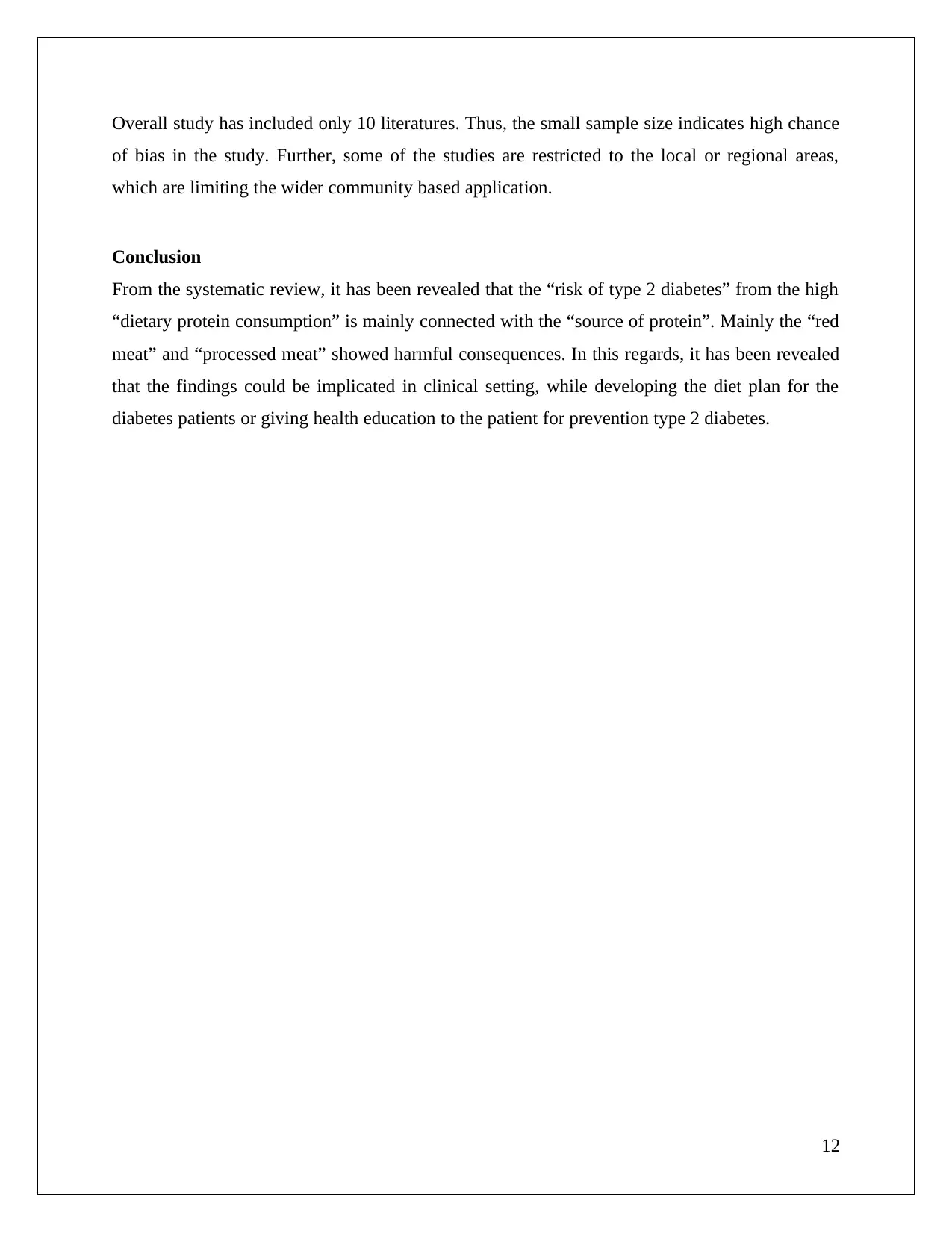
Overall study has included only 10 literatures. Thus, the small sample size indicates high chance
of bias in the study. Further, some of the studies are restricted to the local or regional areas,
which are limiting the wider community based application.
Conclusion
From the systematic review, it has been revealed that the “risk of type 2 diabetes” from the high
“dietary protein consumption” is mainly connected with the “source of protein”. Mainly the “red
meat” and “processed meat” showed harmful consequences. In this regards, it has been revealed
that the findings could be implicated in clinical setting, while developing the diet plan for the
diabetes patients or giving health education to the patient for prevention type 2 diabetes.
12
of bias in the study. Further, some of the studies are restricted to the local or regional areas,
which are limiting the wider community based application.
Conclusion
From the systematic review, it has been revealed that the “risk of type 2 diabetes” from the high
“dietary protein consumption” is mainly connected with the “source of protein”. Mainly the “red
meat” and “processed meat” showed harmful consequences. In this regards, it has been revealed
that the findings could be implicated in clinical setting, while developing the diet plan for the
diabetes patients or giving health education to the patient for prevention type 2 diabetes.
12
⊘ This is a preview!⊘
Do you want full access?
Subscribe today to unlock all pages.

Trusted by 1+ million students worldwide
1 out of 14
Related Documents
Your All-in-One AI-Powered Toolkit for Academic Success.
+13062052269
info@desklib.com
Available 24*7 on WhatsApp / Email
![[object Object]](/_next/static/media/star-bottom.7253800d.svg)
Unlock your academic potential
Copyright © 2020–2026 A2Z Services. All Rights Reserved. Developed and managed by ZUCOL.





